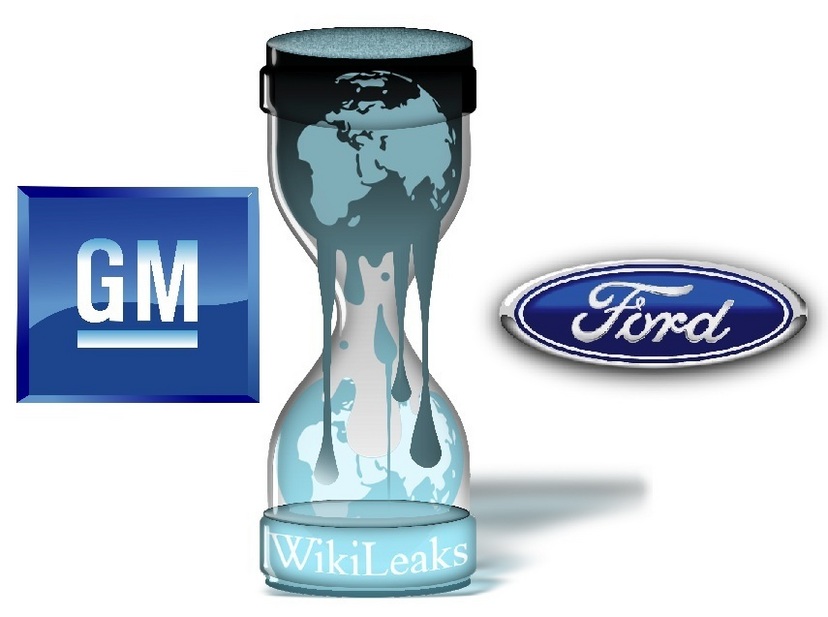|
Send this page to a friend! Fill in the form bellow | ||
news
Wikileaks cables reveal U.S. government involvement with Big 3
© photo by DonkeyHotey, fpra, licence: Attribution Non-Commercial Share Alike
An investigation of more than 100 automotive industry-related cables by The Detroit News has revealed that the U.S. government has been involved in a number of industry issues since the global financial crisis. The cables – part of a recent Wikileaks release of more than 250,000 that were between U.S. embassies and the Washington – show that the involvement of Barack Obama’s administration goes well beyond just the $14 billion bailout.
To quote the report:
“Secret diplomatic cables reveal the U.S. government's deep involvement in a spate of American automotive issues, including China's derailment of Hummer, Germany's anger over the scrapped sale of General Motors' Opel unit, and concern that massive Toyota recalls might impact Japanese-U.S. relations.”
Showing the symbiotic nature of the relationship between business and politics, perhaps the biggest revelation to come about because of the leaks detailed how the Japanese government feared for the welfare of its relationship with the U.S. around the time of the Toyota Prius’ sticking accelerator controversy. A cable sent from the U.S. embassy in Tokyo in February 2009 described how the Japanese government demanded action from Toyota and how the Japanese Transport Minister met with the U.S. ambassador, John Roos, telling him “it is crucial for Toyota to stay ahead of the issue.”
As expected, the U.S. State Department condemned Wikileaks once again for the leaks and declined to answer questions about the government’s involvement in global auto industry affairs. State Department spokeswoman Kerry Humphrey would only say that (part of the embassies' job is to promote) "U.S. exports of manufactured goods, services and farm goods," (by facilitating trade between U.S. companies and foreign markets).
Well yes it is. But to this extent, I don’t think so.
Another massive find was within cables concerning GM’s formerly troubled European division Opel. GM’s proposal to sell Opel and then decision not to apparently angered top German officials including the Prime Minister Angela Merkel, who was so enraged she ignored calls from GM CEO Fritz Henderson and instead called U.S. President Barack Obama to complain. A cable reveals that she said “The Germans are still having trouble understanding how GM could act independently of Washington", while another details that the Germans were upset by GM’s "latest flip-flop, after months of laborious negotiations”. It continues on to say that an aid to the German Economic Minister’s stated "if the U.S. government had GM under better control, this would not have happened."
The Chinese have also had issues with GM as revealed in a February 2009 cable entitled ‘Hummer stuck in the mud’. The communication tells how the U.S. embassy in Beijing learned that the Chinese government were poised to block the sale of Hummer to a Chinese manufacturer because they "recognized the deal would be good for the United States, but failed to see 'what's in it for China,'" as well as considering Hummers to be "gas-guzzling junk."
Further discoveries show that Australian GM-subsidiary Holden was is serious threat of going under during the GFC as its U.S. parent looked to protect its own interests. The anonymously-written documents are believed to be notes taken from a meeting held at the U.S. Consul in Melbourne attended by then Holden Chairman and Managing Director, Mark Reuss. Reuss apparently "appeared frustrated that GM had effectively left Holden in the financial wilderness once it accepted U.S. Treasury (bailout) money". The document continued: “Holden is scraping by in the competitive Australian automotive market, even though financing from its parent company has all but dried up. While Holden will remain a part of the new GM, the Australian subsidiary was ‘fenced off’ from the parent in an attempt to prevent US tax dollars from flowing out of the United States.”
And Ford was not left out either.
It seems that the Dearborn-based manufacturer has had difficulty with Chinese auto company Changan, who it evidently claimed ‘copied engineering data’ from the Mazda 3 (Ford and Mazda have an alliance on this platform). As a result of this, it is said that Ford “now more tightly controls sharing of engineering data" and that its partnership with Changan will “break apart” if trust is not established.
Other notable indiscretions included ‘bragging’ by a Ford executive in Mexico to embassy officials about the company not needing a bailout as GM and Chrysler did, as well as details of a strike at a Ford and Mazda joint venture plant in Thailand in which Ford managers feared for their welfare. The U.S. embassy in Bangkok had to ask for police assistance and eventually managed to settle the dispute.
Unlike GM, Ford didn’t dodge commenting on the cables, with spokeswoman Karen Hampton saying “The details in the document are factual."
Though these leaks are not particularly incriminating (just highly embarrassing), we can thank Julian Assange for a rare insight behind the scenes of the commercial juggernaut that is the American auto industry.
Encyclopedia |
Contribute
more about GM



latest news








